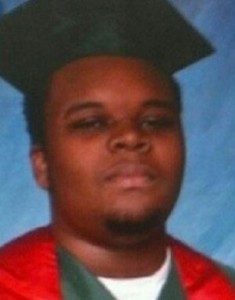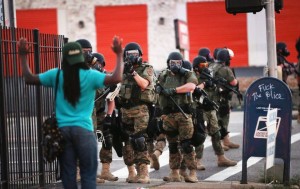
When we are young, often too young to fully understand the anxiety in their voices and the fear in their eyes, many of us listen to our parents tell us how to behave when, not if, we are stopped by the police.
Usually these cautions beseech us to be aware of our surroundings, comply and assert our compliance out loud, to polite and cooperative, not combative or defiant. They tell us the things they think will protect us. They tell us not to be alone. They tell us to be vigilant. They know what we will face. They are black, brown, immigrant, documented and undocumented. They have survived wars. They are our mothers and fathers. Our grandparents and older siblings. Our concerned neighbors and friends. They want to keep us safe. We might not yet know how difficult it is to stay safe, because we are small and bold. Because we are tender and free. But the fear and worry seeps into their voices, because they have seen the world. The fear and worry becomes part of us, too.
Then, as we become adults, sometimes well before then, we discover the lie.
We can genuflect and comply. We can raise our arms in the air and scream that we are unarmed. We can look up at the police with our hands behind our heads and our knees on the ground. We can wait in line through checkpoints to get water and work. We can crawl through the desert in the night with our babies on our back. We will still be counted as collateral damage. That’s if we are counted at all.
We can fire a warning shot into the air to protect our children. We can follow all the rules and get all the papers. We can work 20-hour days in the field. Our compliance will not protect us. Our papers will not save us. The police are not here to protect us. In their eyes, which we see from behind riot gear, we are not human. We are not their charge.
Because we survived this long. Because we made it here. Because we never left. Because our bodies are proof.
In this country, a black man is killed every 28 hours. On Saturday, in Ferguson, Missouri a white police officer shot and killed 18 year-old Michael Brown.
Now all we are left with is a series of heartbreaking truths.

Michael Brown is dead. Next week he was to start college. His friend and several others witnessed his murder. His body was left uncovered in the street for hours. The police officer that murdered Michael is on paid administrative leave. Police showed up to the candlelight vigil held for him wearing riot gear. His mother is left to try and understand why her sweet boy is not home with her. Surely, she had a conversation with him about the police and how to try and stay safe from them. It could not protect him from the weapons they brought. We imagine that it could be us.
The town of Ferguson is burning. With tear-gas and a righteous rage.
We are left to try and make sense of these facts. This story is not new. There is no sense to be made here.

Thank you.
The crimes of the police have no bounds. Their disrespect and disregard for human life is disgusting.
As you say, it does not matter how “good” we are or how compliant. Social media has made us that much more aware of something that has continued unceasing…
It is audacious to give birth and assert life in the face of such irrationalism and hatred. I continue to be amazed and in awe of those who do so.
We were not meant to survive, and yet we have far surpassed survival and are thriving. And this despite the continuous (and permitted) eradication of black life.
I will be sharing your post. Thank you. Be well.
There is a lot of commotion over the nationwide targeting of young Blacks but for all the media attention and handwringing we are talking about exactly four incidents over the last 28 months. As a matter of fact, if a list was produced of racially-motivated white-on-Black murders it wouldn’t make it past number 16 or so before it got to Emmett Till in Mississippi in 1955. White-on-Black crime is very rare. There are more Black-on-Black deaths than that every week in my hometown of Philadelphia, most of which will never make it past the police blotter. Who benefits from this?
To the police it is an “us” against “them” world where you must not aggravate the guys who can fire the chief of police but all others who are not in the department are fair game under most circumstance. Woe be to you if are poor and disadvantaged. Your only possible defense is to totally abase yourself before the forces behind the thin blue line. They can kill and they will be excused for having done so 99.99 times out of 100.
Look in your local papers and see how often the children of the rich, powerful and well connected are beaten, abused and jailed? The ones who can afford to buy illicit drugs are not imprisoned for having bought them. They are sent to a few weeks of rehab and their criminal records bleached as white as the driven snow.